商务英语口译Unit 8 Business Interviews
- 格式:ppt
- 大小:554.50 KB
- 文档页数:28
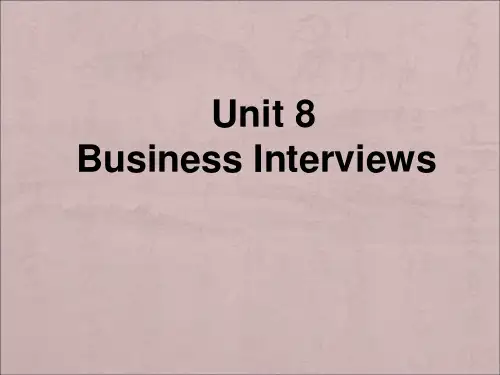
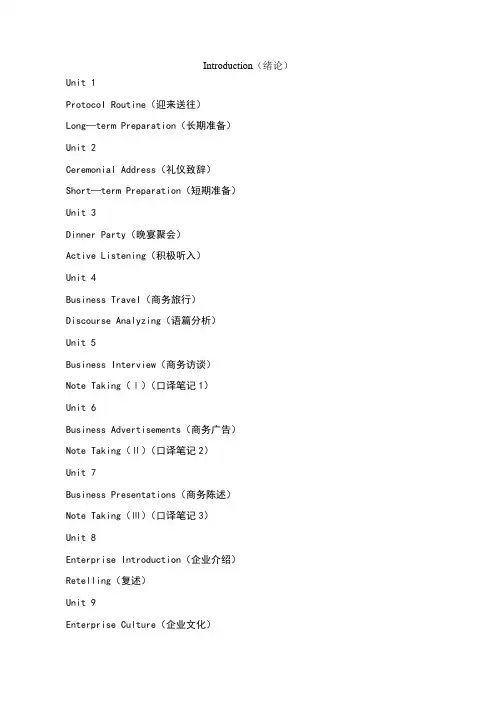
Introduction(绪论)Unit 1ProtocoI Routine(迎来送往)Long—term Preparation(长期准备)Unit 2Ceremonial Address(礼仪致辞)Short—term Preparation(短期准备)Unit 3Dinner Party(晚宴聚会)Active Listening(积极听入)Unit 4Business TraveI(商务旅行)Discourse Analyzing(语篇分析)Unit 5Business Interview(商务访谈)Note Taking(Ⅰ)(口译笔记1)Unit 6Business Advertisements(商务广告)Note Taking(Ⅱ)(口译笔记2)Unit 7Business Presentations(商务陈述)Note Taking(Ⅲ)(口译笔记3)Unit 8Enterprise Introduction(企业介绍)Retelling(复述)Unit 9Enterprise Culture(企业文化)Public Speaking(公开演讲)Unit 10Marketing & Promotion(市场营销)Paraphrasing(一句多译)Unit 11Business Negotiation(商务谈判)Figures Interpreting (数字口译)Unit 12Business Meeting(商务会议)Idioms Interpreting(成语口译)Unit 13Investment&Profits(投资利润)Fuzzy Interpretation(Ⅰ)(模糊表达1)Unit 14Business Policy(商务政策)Fuzzy Interpretation(Ⅱ)(模糊表达2)Unit 15International Exhibition(国际会展)Fuzzy Interpretation(Ⅲ)(模糊表达3)Unit 16Public Relations(公共关系)Sight interpreting《视译练习)Unit 17Business Strategy(商务策略)Shadowing(影子跟读)Unit 18Transportation & Logistics(交通物流)Quality Assessment (质量评估)U n i t F o u rB u s i n e s s T r a v e lUnit Objectives (单元目标)After reading this unit, you shouldunderstand the ways to identify the main ideas of the source text.find ways to improve your interpreting skills and performance.master the basic words and expressions about business travel.know some cultural background knowledge about business travel.reparingI. Interpreting Skills (口译技能)Read the following presentation about discourse analysis and try tounderstand the four speech types and know how to identify the main ideasof the source text. Then complete the following task:1. Listen to the passage, “My first day in New York”, and answer thefollowing questions:1). When did the author first arrive in the US2). What did the author do on the way to his hotel3). Where did the author get something to eat after his friend had left4). Why couldn’t he have what he really wanted at the restaurant5). What did the author do after dinner2. Listen to the passage again and try to catch more details, and thenretell the story in your own words.Decoding Training (II): Discourse Analysis(语篇分析)Interpreting is to “understand and make understood”. To interpret the speech, one must first understand the message of the speech. However, comprehension(理解)of the source discourse goes beyond the simple recognition of words and linguistic structures. The interpreter shall make an analysis of the source discourse. More importantly, the interpreter shall identify(识别)the speech type and know how to identify the main ideas of the original speeches.Identification of the Speech TypesSpeeches are diversified serving different occasions and purposes. It will be of great help to the interpreters if they know the speaker’s style. In most cases, speechesare prepared beforehand. Therefore, a study of the different types of writing helps an interpreter identify the main idea of a given speech. Following are the basic types of writing.1. Descriptive WritingDescriptive(描述性的)writing involves a great deal of detailed information. A descriptive discussion aimed at providing details of an event, a scene, a procedure, or a situation.This speech type demands a thorough background investigation of the speaker and the relevant situation by the interpreter.2. Narrative WritingNarrative(叙述性的)writing focuses on the development of events. There is no doubt that the interpreter should be very sensitive to dates, time phrases, and verb tenses when a narrative speech is dealt with.3. Expositive WritingExpositive(说明性的)writing deals with its subject matter in such orders as chronological, spatial, comparison, and definition. It would be to the advantage of the interpreter to conduct a background investigation of the speaker and the situation, for that would provide the interpreter with not only the necessary glossary but also the speaker’s standpoint(立场).4. Persuasive WritingPersuasive(劝说性的)writers always want to make their arguments clear, strong and convincing. When the purpose is to convince, writers of persuasive writing mainly employ two techniques -- induction(归纳)and deduction(推论). Inductive writing starts with specific examples or points to draw a general conclusion, while deductive writing illustrates its thesis at first and then supports and reinforces the thesis through specific examples or subordinate ideas.Identification of the Main IdeasIn the context of interpreting, the main ideas of the source speech can be identified at the sentence level and at the discourse level. Priority should always be attached to identifying the main idea at the sentence level. We argue that identification of main ideas be done on the basis of sentences. Training in identifying the main ideas in interpreting should naturally take place first at the sentence level.1. Sentence LevelThe most important task for an interpreter to identify the main ideas at the sentence level is to discern (洞悉) the subject, verb and object (SVO). It is highly significant for the interpreter to catch the SVO of the sentence while listening to the source text, as the SVO usually carries the major information of the sentence. For example, when listening to “The best way to carry money while traveling is to have a major credit card”, the interpreter is expected to catch “The best way is to have a credit card.”If the interpreter is able to catch the SVO of the sentence, he then will produce a complete sentence with the major information in the target language.2. Discourse LevelThere are also some skills an interpreter might employ on different occasions for grasping the gist(要点)of a speech at the discourse level. In a well-organized speech, the speaker usually explains his point in the first few sentences. Therefore, one of the ways to get the main idea of a speech is to attach priority to the beginning of the speech. Secondly, if the interpreter encounters a speech that is inductively constructed, the interpreter should, to the best of their ability, conduct a study of the speaker's background and viewpoints so that they can follow the speaker's logical guidelines.II. Phrase Interpreting (短语口译)Work on the following words and phrases. Interpret them into Chinese andEnglish respectively.A. English to Chinese1. Have a population of…2. Cover an area of…3. Date back to…4. Have a history of…5. Be situated in…6. The gross domestic product7. Dive-in restaurant 8. Quarantine certificate9. Duration of stay 10. Residence permitB. Chinese to English1、日程安排2、旅行路线3、起飞时间4、机场大楼5、候机室6、贵宾室7、问讯处 8、安全检查9、免税店 10、个人物品III. Sentence Interpreting (句子口译)Work on the following sentences. Interpret them into Chinese and Englishrespectively.A. English to Chinese1. I believe you're going out of your way for us.2. Wouldn't you like to spend an extra day or two here3. I'm afraid that won't be possible, much as we'd like to.4. I wonder if it is possible to arrange shopping for us.5. I will keep you posted.B. Chinese to English1. 我特地为你们安排,使你们在北京的逗留愉快。
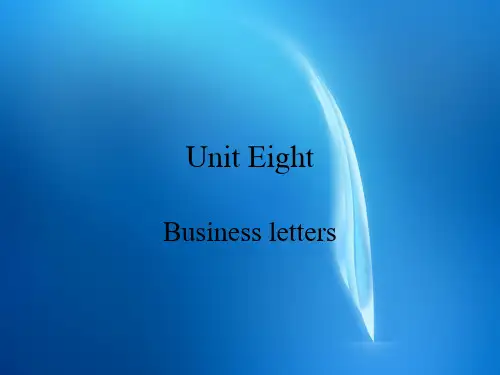
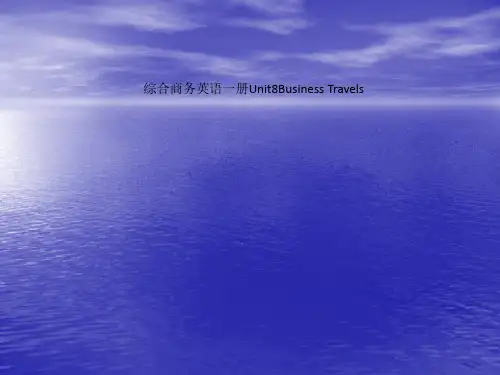
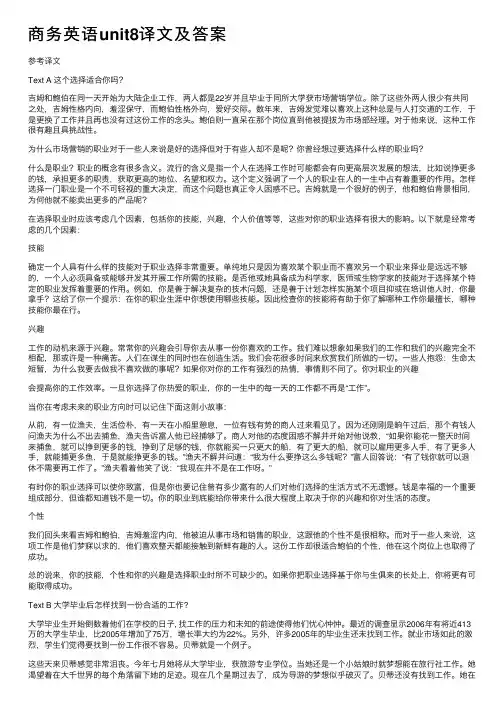
商务英语unit8译⽂及答案参考译⽂Text A 这个选择适合你吗?吉姆和鲍伯在同⼀天开始为⼤陆企业⼯作,两⼈都是22岁并且毕业于同所⼤学获市场营销学位。
除了这些外两⼈很少有共同之处,吉姆性格内向,羞涩保守,⽽鲍伯性格外向,爱好交际。
数年来,吉姆发觉难以喜欢上这种总是与⼈打交道的⼯作,于是更换了⼯作并且再也没有过这份⼯作的念头。
鲍伯则⼀直呆在那个岗位直到他被提拔为市场部经理。
对于他来说,这种⼯作很有趣且具挑战性。
为什么市场营销的职业对于⼀些⼈来说是好的选择但对于有些⼈却不是呢?你曾经想过要选择什么样的职业吗?什么是职业?职业的概念有很多含义。
流⾏的含义是指⼀个⼈在选择⼯作时可能都会有向更⾼层次发展的想法,⽐如说挣更多的钱,承担更多的职责,获取更⾼的地位、名望和权⼒。
这个定义强调了⼀个⼈的职业在⼈的⼀⽣中占有着重要的作⽤。
怎样选择⼀门职业是⼀个不可轻视的重⼤决定,⽽这个问题也真正令⼈困惑不已。
吉姆就是⼀个很好的例⼦,他和鲍伯背景相同,为何他就不能卖出更多的产品呢?在选择职业时应该考虑⼏个因素,包括你的技能,兴趣,个⼈价值等等,这些对你的职业选择有很⼤的影响。
以下就是经常考虑的⼏个因素:技能确定⼀个⼈具有什么样的技能对于职业选择⾮常重要。
单纯地只是因为喜欢某个职业⽽不喜欢另⼀个职业来择业是远远不够的,⼀个⼈必须具备或能够开发其开展⼯作所需的技能。
是否他或她具备成为科学家,医师或⽣物学家的技能对于选择某个特定的职业发挥着重要的作⽤。
例如,你是善于解决复杂的技术问题,还是善于计划怎样实施某个项⽬抑或在培训他⼈时,你最拿⼿?这给了你⼀个提⽰:在你的职业⽣涯中你想使⽤哪些技能。
因此检查你的技能将有助于你了解哪种⼯作你最擅长,哪种技能你最在⾏。
兴趣⼯作的动机来源于兴趣。
常常你的兴趣会引导你去从事⼀份你喜欢的⼯作。
我们难以想象如果我们的⼯作和我们的兴趣完全不相配,那或许是⼀种痛苦。
⼈们在谋⽣的同时也在创造⽣活。
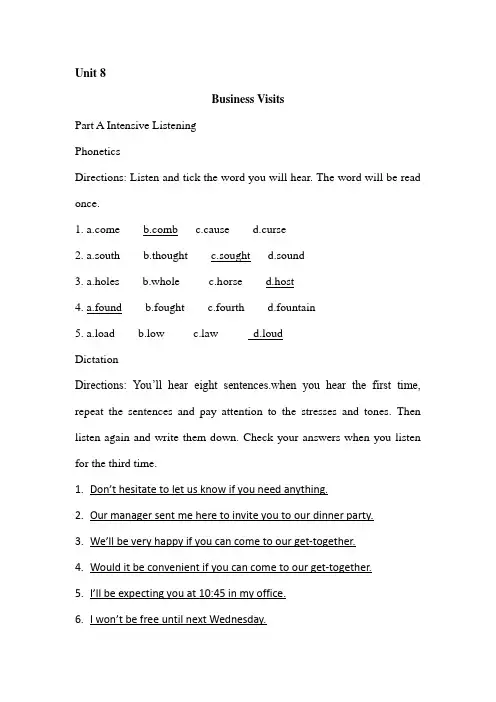
Unit 8Business VisitsPart A Intensive ListeningPhoneticsDirections: Listen and tick the word you will hear. The word will be read once.1. e b c.cause d.curse2. a.south b.thought c.sought d.sound3. a.holes b.whole c.horse d.host4. a.found b.fought c.fourth d.fountain5. a.load b.low w d.loudDictationDirections: You’ll hear eight sentences.when you hear the first time, repeat the sentences and pay attention to the stresses and tones. Then listen again and write them down. Check your answers when you listen for the third time.1.Don’t hesitate to let us know if you need anything.2.Our manager sent me here to invite you to our dinner party.3.We’ll be very happy if you can come to our get-together.4.Would it be convenient if you can come to our get-together.5.I’ll be expecting you at 10:45 in my office.6.I won’t be free until next Wednesday.7.Let’s set a day to continue our talk.8.We’ve arranged our schedule without any trouble.part B Extensive ListeningDialoguesDirections: You’ll hear 5 short dialogues in this section. At the end of each dialogue, one question will be asked. Both the dialogue and question will be spoken only once. Mark the best answer for each question.1.W: Didn’t you tell Tom about t he meeting?M: Whatever I say to him goes in one ear and out from the other.Q: What does the man mean?A. Tom has trouble in his ears.B. Tom didn’t say anythingat the meeting.C. Tom doesn’t listen to him.D. Tom has troubleunderstanding him.2.M: Can you tell me what time Flight 318 arrives?W: Yes, at 6:00 p.m. , but it has been delayed for two hours.Q: When is the airplane now expected to arrive?A.6:00 p.m.B. 8:00 p.m.C. 9:00 p.m.D. It is delayed.3.W: I can’t understand why my friend isn’t here yet. Do you thinkwe should try to call her or go look for her?M: She probably just got tied up in traffic. Let’s give her a few more minutes.Q: What are these people going to do?A. Check the time of high time.B. Go stand under theclock.C. Wait a little longer.D. Look for the traffic light.4.M: Wasn’t our appointment at 10:30?W: It was. But I had to be 15 minutes late.Q: What time did the woman arrive?A. 10:00B. 10:30C. 10:45D. 11:155.M: Wasn’t our appointment at 10:30?W: It was. But I had to be 15 minutes late.Q: What time did the woman arrive?A. 10:00B. 10:30C. 10:45D. 11:15ConversationArranging VisitsDirections: Listen to the conversation and complete the followingexercises.Words and Expressionsschedule n. 时间表the Great Wall 长城garment n. 衣服the Palace Museum 故宫technology n. 科技places of historic interest 古迹scenic spot 景点Fisher: You have given me a lot of help since I came here. Zhang: No t at all. We haven’t done much. After all, it’s your first visit here and we’d like you to feel at home. If there isanything special you want, you can always tell us. Fisher: Thank you. If you’re free this afternoon, I’d like to visit some factories.Zhang: There is nothing scheduled after lunch. We intend to take you to the garment factory, if you like. There are variousnew products on display in their sample room. Theproducts will give you some ideaof recent improvements inquality and technology.Fish er: That’s wonderful! I hear many of their products have been exported in large quantities to many countries.Zhang: That’s true. I hope we can have a satisfactory cooperation together in the future. Are there any scenic sports youwant to see in China?Fisher: If we had time, I would like to go to the Great Wall and the Palace Museum.Zhang: Let’s arrange to visit the factorythis afternoon and we will do our best to take you to see these places of historicinterest some other day.Fisher: That’s great. Tha nk you very much.Section ADecide whether the following statements are ture or false. Write “T” for true and ”F” for false in the brackets.( F ) 1. They planned to visit the factory tomorrow.( T ) 2. They intended to visit a factory producing garments.( F ) 3. There are only a few new products on display in sample room.( T ) 4. Mr. Wilson would like to go to the Great Wall and the Palace Museum.( F ) 5. The products will show recent improvements in quality and price.Section BListen to the conversation again and complete the following statements.1. You have given me a lot of help since I came here.2. If you’re free this afternoon,I’d like to visit some factories.3. I hope we can have a satisfactory cooperation together in the future.4. Are there any scenic spots you want to see in China?5. Let’s arrange to visit the factory this afternoon.Part C Listening & Speaking IntegrationConversationA Visit to a Sample RoomDirections: Listen to the conversation and complete the following exercises.Words and Expressionsdazzling adj. 令人眼花缭乱的,耀眼的commission n. 佣金springy adj. 富有弹性的magpie n. 喜鹊unique adj. 独特的 a large collection of 大批,许多antique adj. 古老的offer from stock 报现货tapestry adj. 织锦,挂毯find a ready market 畅销velvet n. 丝绒,天鹅绒sound out 试探Liang: Here is our sample room. If you have any questions about our samples displayed here, I’d be glad to explain them for you.White: Thank you. You certainly have a large collection of sample carpets here. What a dazzling display!Liang: We are exporting a wide range of carpets to many countries and the demand is getting greater and grearer. I’m sure our products will find a ready market in your area, too.White: I think so. Chinese carpets are very attractive.Liang: You said it! The point is that the quality of our carpet is just as good as what you’ll get from other suppliers while our prices are not as high as theirs. Mr. White, this way please. Here is a pure wool carpets…oh, and this one is hand-woven.White: Oh, the designs are so nice! And the material is soft and springy.Liang: this is the well-known Beijing style carpet. Its pattern is very popular and the style is unique and antique.White: what about your tapestries?Liang: this way please, Mr. white. We can supply you with various kinds of tapestries, such as pure wool and velvet. Look at these tapestries of different patterns.White: really magnificent! What does the design mean?Liang: the design of a magpie on a plum tree branch stands for good luck and happiness. You see, all these are are fine pieces of art. And the velvet tapestries are among the major exports. They are well received wherever they go. They are our best selling lines. Why not place a trial order to sound out the market potential?White: yes, i was thinking of the same thing. By the way, how long does it normally take you to ship an order?Liang: it's hard to say. It depends on what you choose and the quantity you want. Anyway we always honor what we promise in the contract. It's our principle in business to carry out the terms of our contract to the letter and stand by what we say.White: thank you, Mr. liang. What commission do you usually pay for your exports? We import on commission basis.Liang: that can be discussed. We'll consider it when we come to the concrete business.White: very nice indeed. Now that I've seen the exhibits, I think some of the items will find a ready market in Canada. I'd like to give yourproducts a try, but your delivery must maintain the quality standard of your samples. You know, it's no easy job to push the sale of a new product. When can we meet again for more specific discussion, Mr. Liang?Liang: please call again any time you like. It's my pleasure to be of help to you.White: that's very kind of you.Section aChoose one from the four options to complete the following statements.1.The commodity they are talking about at the beginning is ---------A.Tapestries b. Carpets c. Bedspreads d. Sheets2.The design of a magpie on a plum tree branch stands for --------A.Happiness b. good luck c. wealth d. Both a and b3.The time to ship an order depends on --------A.Quality b. Quantity c. specification d. size4. Mr. White does business on ------A fob b. Commission c .lc d.. cash5.In the conversation Mr. White intends to give the products a try in ------A.America b. india c. swiss d. CanadaSection bWork on the following task. You may borrow some ideas from what you have just heard.Visiting the sample room, Mr. White was really interested in the business cooperation with Mr. Liang's company. The next day, Mr. Liang and Mr. White are going to have a specific discussion on the terms of payment as well as the terms of delivery. Now work with your partner and role play the both sides respectively.PassageFord rouge factory tourDirections: listen to the passage and complete and the following exercises.Words and expressionsManufacture 生产multiplex 多元Distribute 分配approximately 大约Automobile 汽车triumph 成功;胜利Continent 大陆square feet 平凡英尺Affiliate 使隶属于:是附属于assembly process 装配过程Welcome to our ford rouge factory tourFirst, let me give you a brief introduction of ford. Ford motor manufactures and distribute automobiles in 200 markets across six continents. With about 300 000 employees and 108 plants worldwide, the company has core and affiliated automotive brands.The ford rouge factory is located in the south of Detroit at the meeting of the rouge and Detroit rivers. The original rouge complex is a mile and a half wide and more than a mile long. The original rouge complex of 93 buildings totals 15767708 square feet of floor area. Buildings include plants for tire-making, stamping, engine casting, frame and assembly. Our factory tour today has four parts:First, you will take the historic driving tour. Buses will transport you for a narrated tour past famous landmarks and behind the scenes of this massive manufacturing complex. It will take approximately 20 to 30 minutes.Second is the rare historic footage viewing Here you will see a short film of rare, never-before-seen historic footage. You will learn about the triumphs and tragedies surrounding the rouge. It takes 13 minutes.Third is the virtual reality experience. A virtual reality theater will provide you with a virtual reality theater will provide you with a360-degree look at how automobiles are made! The approximate time for this 15 minutes.Finally we come to the assembled in the view, lean and flexible manufacturing plant. Visitors will have the opportunity to view the final assembly process from an elevated walkway. The tour takes about 30 to 40 minutes.Section aSuppose you are among the clients who are touring the ford factory now. Every one of you is presented a schedule of your trip here it is . You will have a discussion in your group about the company you are going to visit as well as your trip that day.FordThe name of the company: ford motorSales areas: 200 markets across six continents The number of employees: 300 000The number of plants: 108The location ford rouge factory: in the south of DetroitThe number of the buildings: 93Tour of today:1.the historic driving tour2.the rare historic footage viewing3.the virtual reality experience4.the assembly plant walking tourSection bOne of your colleagues was late for the tour and missed the introduction. Please give hime/her a brief introduction of the company and the details of the schedule.Part dRole-playWork with your partner to create dialogues with the situations given below.Task 1: imagine you an assistant manager in the company, and you are going to show your customer around some factories, now you are telling them the schedules during their stay here.Task 2: imagine you are a clerk at the exhibition of leather handbag’s, you greet the customers and describe your products.Task 3: imagine there is an exhibition. A customer is interested in your new DVD player. You greet him and introduce your products.Topic discussionDiscuss the following topics.1.when you are invited to a dinner party, what are suitable gifts to bringwith you?2.do you think early arrival at a party is polite? Why /why not?3.if you are attending an overseas exhibition, what should be arranged? Related information?:Before the foreign guests arrive, it’s necessary to book proper rooms for them, rooms that are comfortable, air-conditioned, and equipped with private bathrooms are highly recommended. When the foreign guests arrive, it is good manners to meet them in person, or at least, to send someone to meet at the airport, on the way to the hotel, topics regarding their flights, trips, as well as schedules are good icebreakers.Before meeting a foreign guest, it is a must to be aware of the visitor’s background and to understand the visitor’s objectives and his desired itinerary. When receiving a foreign guest, it is polite for to open the door and let them go through the door first. Please use a little strength but not too tightly when shaking hand with the visitor. It is not appropriate to ask the guest’s age, salary, and other private matters, on formal occasions, casual clothes are not good choices.。
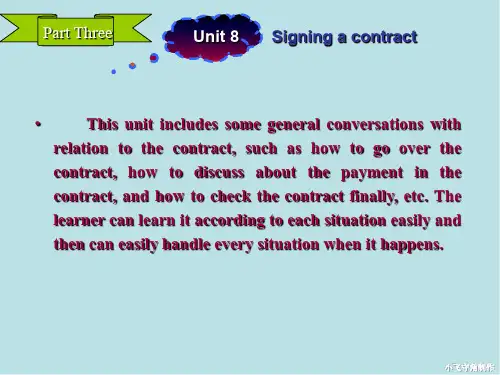

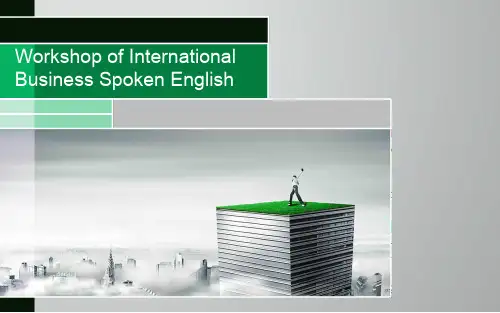

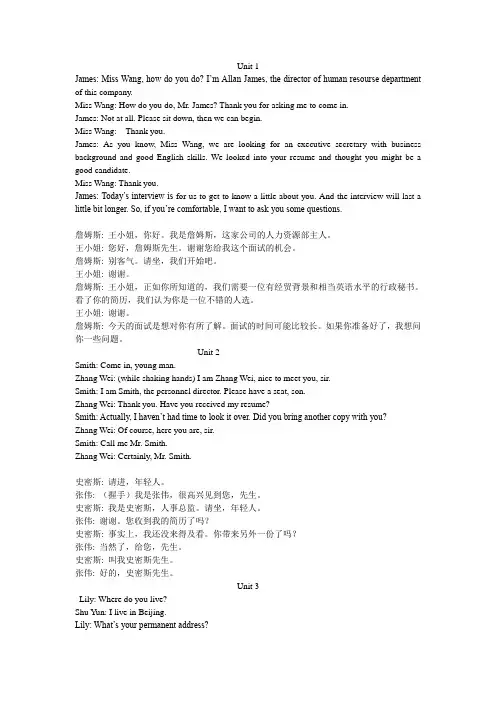
Unit 1James: Miss Wang, how do you do? I’m Allan James, the director of human resourse department of this company.Miss Wang: How do you do, Mr. James? Thank you for asking me to come in.James: Not at all. Please sit down, then we can begin.Miss Wang: Thank you.James: As you know, Miss Wang, we are looking for an executive secretary with business background and good English skills. We looked into your resume and thought you might be a good candidate.Miss Wang: Thank you.James: Today’s interview is for us to get to know a little about you. And the interview will last a little bit longer. So, if you’re comfortable, I want to ask you some questions.詹姆斯: 王小姐,你好。
我是詹姆斯,这家公司的人力资源部主人。
王小姐: 您好,詹姆斯先生。
谢谢您给我这个面试的机会。
詹姆斯: 别客气。
请坐,我们开始吧。
王小姐: 谢谢。
詹姆斯: 王小姐,正如你所知道的,我们需要一位有经贸背景和相当英语水平的行政秘书。
看了你的简历,我们认为你是一位不错的人选。
王小姐: 谢谢。
詹姆斯: 今天的面试是想对你有所了解。
新编剑桥商务英语(初级)学生用书_答案1. Unit 1: Getting StartedReading Task1.The United Nations International Children’s Emergency Fund.2.Its headquarters is in New York City, USA.3.To advocate for the protection of children’s rights and improve their lives.4.The rights and well-being of every child. Vocabulary Task1.satisfy2.temporarily3.repair4.shipment5.suitableListening Task1.False2.True3.True4.False5.False2. Unit 2: CommunicationReading Task1.People working in multinational companies.2.Because of differences in culture, customs, and business practices.3.Cultural sensitivity, adapting communication style, and understanding non-verbal communication.4.Polite greetings, appropriate dress code, and being punctual.Vocabulary Task1.manage2.appropriate3.gesture4.moderate5.standardListening Task1.C2.B3.A4.B5.A3. Unit 3: Business TravelReading Task1.It helps to establish and maintain business relationships.2.Making hotel reservations, booking flights, and arranging transportation.3.They need to be aware of local customs, etiquette, and have knowledge of the local language.4.Preparation, documentation, and being organized. Vocabulary Task1.navigate2.accommodation3.confirm4.transport5.locateListening Task1.B2.A3.C4.B5.C4. Unit 4: Company OrganizationReading Task1.To understand the structure, roles, and responsibilities within a company.2.It provides a clear understanding of the hierarchical structure within a company.3.It helps to ensure effective communication and coordination between different departments.4.Functions, departments, and positions. Vocabulary Task1.assign2.colleague3.document4.policy5.superviseListening Task1.C2.A3.B4.C5.A5. Unit 5: Job InterviewsReading Task1.It is an opportunity for employers to evaluate the suitability of candidates for a specific job position.2.Preparing for commonly asked questions and practicing good body language.3.Being well-groomed, dressing appropriately, and being confident.4.Asking relevant questions and expressing gratitude for the opportunity.Vocabulary Task1.evaluate2.relevant3.confident4.opportunity5.gestureListening Task1.C2.B3.A4.B5.A6. Unit 6: Telephone SkillsReading Task1.It is a commonly used tool in business communications.2.To ensure effective communication and maintain good business relationships.3.Answering professionally, speaking clearly, and paying attention to tone and pace.4.Taking messages, transferring calls, and resolving issues.Vocabulary Task1.effectively2.professional3.manner4.transfer5.issueListening Task1.B2.C3.A4.B5.C7. Unit 7: Emails and Writing SkillsReading Task1.Emails are used for quick and efficient communication.2.Formal and informal emails.3.Subject line, greeting, body, and closing.4.Being concise, using proper grammar and punctuation, and proofreading.Vocabulary Task1.efficient2.formal3.grammar4.proofread5.conciseListening Task1.C2.B3.A4.B5.A8. Unit 8: PresentationsReading Task1.To effectively communicate information, ideas, and proposals to a group of people.2.Planning, creating visual aids, and practicing the delivery.3.Confidence, eye contact, and engaging with the audience.4.Structuring the presentation, using visual aids, and answering questions.Vocabulary Task1.effectively2.visual3.audience4.engage5.structureListening Task1.B2.C3.A4.B5.C9. Unit 9: Business CorrespondenceReading Task1.It is written communication between businesses or individuals.2.To provide information, make inquiries, and establish business relationships.3.Proper salutation, clear and concise content, and professional closing.4.Business letters, memos, and emails.Vocabulary Taskmunication2.inquiries3.content4.professional5.memosListening Task1.A2.C3.B4.C5.A10. Unit 10: Socializing and EntertainmentReading Task1.It helps to build rapport and strengthen business relationships.2.Attending social events, dining out, and participating in recreational activities.3.Appropriate behavior, cultural sensitivity, and beinga good listener.4.Small talk, cultural knowledge, and expressing gratitude.Vocabulary Task1.strengthen2.appropriate3.behavior4.listener5.gratitudeListening Task1.C2.B3.A4.B5.CThis is the answer key for the New Cambridge Business English (Ele mentary) Student’s Book.。
文档从网络中收集,已重新整理排版.word版本可编辑.欢迎下载支持.目录Day today Office日常事务1 Faxes传真2 Telephone Calls电话3 Making Telephone Appointments电话预约4 Memos备忘录5 Business Correspondence商业信函6 Placing an Order下订单Office Talk办公室谈话7 Coworkers同事8 Bosses老板9 Brainstorming集体讨论10 Commuting乘公交车上下班11 The Working Lunch工作午餐Business Trip商务旅行12 International Business Travel国际商务旅行13 Dressing for Business商务着装14 Hotel Situations旅馆情景15 Negotiating the Subway乘地铁Client Reception接待客户16 Receiving Clients接待客户17 Entertaining Clients招待客户18 Accommodating Foreign Clients接待国外客户19 Factory Tours参观工厂Business Communization商务交流20 Personal Introductions个人介绍21 Small Talks聊天22 Delivering Bad News传达坏消息23 Polite Questions礼貌提问24 Farewells道别Negotiation谈判25 Clarifying the Stakes说明利害关系26 Making Concessions做出让步27 Discussing the Bottom Line讨论底线28 Accepting and Confirming接受和确认29 Hard Bargainers VS Soft Bargainers强硬的对手和温和的对手Company Organization公司结构30 CEO执行总裁31 Stockholders股东32 Board of Directors董事会33 Managerial Staff管理人员34 Labor Staff普通员工Meetings and Interviews会议和面谈35 Executing Meetings开会36 Performance Reviews业绩评估37 Agendas会议议程38 Making Requests提出要求Presentations业务陈述39 Preparation and Developing Your Topic准备和展话题40 Introductions and Beginnings介绍和开头41 Making Transitions in the Presentation陈述中的过渡42 Conclusions结论43 O&A (Question and Answer Period)提问阶段Data数据处理44 Trends趋势45 Systems制度46 Scheduling日程安排47 SWOT An山sis态势分析48 Statistical Reports数据统计报告Technology技术49 Email电子邮件50 Computer Technology计算机技术51 Running an Internet Business网上做生意52 Electronic Gadgets数码产品53 Web based Marketing网上营销Financial Topics财务话题54 Costing成本55 Budgets预算56 Auditing审计57 The Economy经济58 Fundraising集资Legal Topics法律话题59 Confidentiality机密60 Lawyers律师61 Contracts合同62 Copyright版权文档从网络中收集,已重新整理排版.word版本可编辑.欢迎下载支持.63 Patents专利64 Environmental Regulations环境条例Marketing Topics营销话题65 Marketing Surveys市场调查66 Target Audience目标消费者67 Print and Media Advertising印刷和媒体广告68 Promotional Events促销活动69 Developing the Market市场开发Sales Topics销售话题70 Selling Points卖点71 Trade Shows贸易展览72 Sales Reviews检查销售额73 Product Demonstrations产品演示74 Following up on Leads线索追踪75 Customer Service顾客服务International Topics国际话题76 Sourcing得到供货77 Export/Import出口/进口78 Exchange Rates汇率79 International Greeting Methods国际问候方式Big Business跨国公司80 Mergers合并81 Competition竞争82 Climbing the Corporate Ladder进入管理层83 Branch Offices分支机构84 Consulting咨询Employment Practices雇用惯例85 Fair Pay公平薪酬86 Recruiting Personnel人员招聘87 Retirement退休88 Partnership合作关系89 R&um6s简历90 Job Interviews求职面试Social and Equality Issues社会和平等话题91 Women in the Workforce职业女性92 Discrimination歧视93 Welfare福利94 Labor Unions工会95 Strikes and Demonstrations罢工和示威游行Continuing Education继续教育96 Management Training管理人员培训97 Seminars/Workshops研究会/研讨会98 Company Retreats公司培训99 Teambuilding团队建设100 MBA工商管理硕士1 Faxes传真Dialogue oneM:Can you have the briefs from the Anderson firm's lawyer on my desk by tomorrow morning. There are quite a few very time sensitive matters with this case. I'm afraid I can't wait any longer.F:Getting those Anderson briefs has been harder than you can imagine.I have tried to contact their lawyer many times. But every time I call, His secretary says he’s in a meeting or out of the office or away on business. I am beginning to think he is trying to avoid me.M:That's highly possible. He knows if we miss our filing deadline, we don’t stand a chance to compete against them for the bid. Try to get a hold of him again. Give him a call and see if he can fax them first thing. F:What if I can't speak to him directly?M:Ask his secretary to fax them. It’s the same thing. Have them faxed over with a copy also faxed to Martin’s office.F:How do I find Martin’s fax number? Is he in your roller desk?M:No, but you can also call their office and ask the secretary to give you their fax number. I’ll email you their office number later today.F:Ok, I'll get on it first thing.M:Be sure you do, I need those briefs ASAPDialogue twoM:Did you put this morning's faxes on my desk? I’m waiting for some urgent faxes from headquarters, I'm pretty sure they came in last night.F:Everything that came in the office fax machine last night is all on your desk, but I noticed that some of faxes came through pretty blurred, maybe you take a look at them, if the copy is unreadable, I'll call then and ask them to refax.M: Yeah, you're going to have to call them and get them to be refax. These copies are so dark. I can't make out any of the words.F: What about that one?M: This one? This one is so light and I can barely read it. How can thatbe?F: You know, I think the fax machine is out of toner. I can change the toner cartridge. That should solve the problem.M:Yes, but this one will have to be refaxed as well. And look, there's about 3 pages missing. It looks like the fax machine ate half of my important faxes, and ones that made it through are so blurred or too light. They are unreadable.F: I guess the fax machine is out of paper too. Don't worry, I'll have someone look at it this afternoon, and in the meantime, I'll have your documents refaxed to our other fax machine.2\Telephone Calls电话Dialogue 1A: Hello, thank you for calling Bradford and Sons. This is Tracy speaking, How may I help you?B: Hello. I would like to speak to your director of human resources, Ms. Jenkins, Please.A: Just a moment. I'll check to see if she is at her desk. May I tell her who is calling?B: This is Bill Burton from Milford Insurance, I'm calling in regards to our meeting next Tuesday.A: Thank you, Mr. Burton. Can you please hold for a moment? I’ll check to see if she is available.B: No problem.A: I'm sorry. Ms. Jenkins is away from her desk. She has already left for lunch. Would you like to leave a message for her?B: Yes, please have her return my call when she returns to the office. It's best if she can get in touch with me before 3 pm today, she can reach me at my office number, 635-8799.A: I'm sorry. I didn't quite catch that, could you please repeat the number?B:No problem, my office number is 635-8799. Tell her to ask for extension 31.A: I'm sorry, Mr. Burton, just to confirm, your name is spelled B-U-R-T-O-N, is that correct?B: Yes, and I represent Milford Insurance.A: I will make sure Ms. Jenkins receives your message and returns your call before 3pm this afternoon.B: Thank you very much. Dialogue2A: Hello, Pasadena Inn, this is Sandy, how may I direct your call?B: I'd like to speak to someone about reservations.A: I can help you with that. What date would you like to make a reservation for?B: We'll be arriving May 12th, but I would like to make reservations for penthouse.A: Oh, I'm sorry Sir. I only handle bookings for our standard rooms. The person you need to speak with is Tony Parker, He makes all the arrangements for our executive accounts. Unfortunately, he's not here right now. Can I take your name and number and have him get back to you?B: When do you expect him back in?A: He'll be out all afternoon, he might not be able to return your call until tomorrow. Will that be alright?B: Yes. I suppose. My name is Sam Darcy. He can contact me at 660-843-3235.A: Could you please spell your last name for me?B: Sure. It's D-A-R-C-Y.A: Okay. Mr. Darcy, and your phone number is 660-843-3233?B: That's 3235.A: Sorry! 3235. Great. I'll have Tony call you first thing tomorrow morning.3. Making Telephone Appointments电话预约Dialogue oneM:Hello, Bill Breton speaking. What can I do for you?F:Hello, Mr. Breton, this is Jenny Jenkins of Bradford and sons returning your call. I’m sorry you missed me when you called my office this morning. My secretary said you called concerning our meeting next Tuesday?M:Yes Ms Jenkins, thank you for returning my call. I’m glad to finally get hold of you. I want to let you know I will not be able to make our meeting next Tuesday. I would be out of town that day. Is there any possibility we can move the meeting to Monday?F:I am sorry. I’m afraid I am completely booked on Monday. Would it be Possible to postpone until you return?M: Oh, dear. I was counting on taking care of our meeting before I leave. But I suppose I can shut off a few things. Yes, we can arrange something.I will be back Thursday morning. What about Thursday afternoon? Would that work for you?F: That should be fine. S hall we say about two o’clock?M: Perfect! I look forward to seeing you at two o’clock next Thursday afternoon. If you need to change the time, pls feel free to call me on my cell phone.F:Thanks Burdon, I’ll see you on Thursday.Dialogue twoF: HelloM: Hello, is Doras available?F: This is Doras, who is calling please?M:Hi, Doras, this is Mike calling from parker’s dentistry. I’m calling to confirm your appointment for tomorrow morning at 9am with Doctor Parker.F: Oh, I almost forgot. Thank you for calling to remind me. Actually, I do need to change the time of my appointment. I have a scheduling conflict, A nd I can’t make it that early.M: If I put you in that later slot, would that work out?F:It would have to be after lunch. Do you have anything available about 2 o’clock?M: Sorry, Mam. The only opening we have after lunch is 1: 15, but I might be able to work you in at 4: 00. Would that be a better time? F:That’s all right. I think I should be able to make it at 1: 15. Can you put me down for that time slot?M:No problem, I have your appointment changed from tomorrow morning to tomorrow afternoon at 1: 15F: Wonderful. Thanks very much.4 Memos备忘录Dialogue 1A: I have been waiting here in the conference room for ten minutes already, what time is the meeting start? Where is anyone anyway?B: Didn't you hear about that, our meeting was postponed until Friday. A: Why the meeting was postponed? No one told me anything about it.B:Did you get the memo?A: What memo? They haven’t any memo this whole week,I check my inbox every day. And I haven’t seen anything.B:The memo went out 3 days ago. It should have made to your inbox, but maybe lost in all collectors on your desk.A: You know how things get pilot about my desk when I'm busy. I know sometimes I do many please things, But I always read all the memos go around; they go directly to my inbox. Are you sure were send to whole office?B:It should have got around to everybody, they also post a copy of the memo in the break room. Don't you ever look at messages post on the bulletin board?A: I'm usually too busy to take a bunch of coffee break by the water cooler, Anyway, I'm sure the memo never get to my inbox, I'll have to talk our secretary about it.B. That's right, You will never know what your missing out of it if you don't read the memos.Dialogue 2A: Ms. Dorsen, I need to take a dictation for me,B:Yes, sir.A: They should go out intra office memorandum to all employee by this afternoon, are you ready?B:Yes, sir, Go ahead.A: Attention all staff: effective immediately, all office communication are restricted to email correspondence as official memos, the use of instance message program by employee during work hour are strictly prohibited.B:Sir, Does this apply to intra office communication only or relate also restrict external communications?A: It should apply to all communications. Not only in this office between employees, but also any outside communications.B:But sir, many employees use instance messaging to communicate with clients.A: This were just have to change the communication methods, I don't want any one use instance messaging in this office, it waste too much time. Now, please, continue the memos. Where were we?B:This apply to internal and external communications.A: Yes, any employee who persist using instance messaging, will first receive a warning, and placed on prohibition, and the second sense, the employment will be termination. Any question regarding this new policy maybe directly to the department of his.B:Is that all?A: Yes, please give this memo type out and distribute to all employees before 4: 00 PM5/Business CorrespondenceDialogue one.A: Did you see the letter I got from Bradform films? They sent the responds to your phone call last week.B: If you want to see something about my call last week, why didn't they sent it to me?A: I guess it must have contact information, so they sent it addressed in care of your department head, anyhow, they wrote to confirm in reading what you discussed about Milton contract.B: Can I see it first in seconds?A: Sure, here it is.B:Dear Mr. Clock, bother to your telephone call last Friday, I'm reading to confirm our meeting on July 21st, as we discussed, our meeting is to review the contract details.A: Did they ask you to sent the files beforehand?B:Let's see, We'll be grateful for the complete to send related materials to our office prior to our meeting. It looks like. . . Hey! Was there anything else was send along with this letter?A: I don't think so, why do you ask?B:The letter writes: please find the enclosed copy of our agenda for your review, I don't see anything else in the envelope.A: Maybe they forgot to attach it to the letter. You should give them another call.Dialogue 2.A: Can you help me for a minute?B: Sure, what I can do for you?A: I'm try to write a letter to one of our clients, But I just don't know exactly what to say, I don't even know how to get started, I know I should write dear Mr. Mrs. or Ms. , but the problem is I don't know the name of contact person.B: You can just put Dear Sir or Madam, officialese not personal, you can write to whom may concerned.A: OK, So I first thanks them for their business, I can say something like "we are very grateful for your continue support", How is that?B:Good! But also, write off the bed you want to tell them the reason of your writing, give them more reference.A: Like "Regarding our new product line, we would like to announce a special price discount"B:Right, do you need them to respond?A: Yes, the letter would have a survey inside, and they should complete it and return to our office. How should I write that?B:You can tell them" Please finding the enclosed customer service survey, else also, you can say: "Attach a customer survey". If you need resource it right away, you can tell them the urgent by saying " Please return the survey without delay as soon as possible. Maybe it more polite with this as early as convenience. "B:Great! and what do you think I should close it with?A: Since you don't know them that well personally, probably the best way is would be your ? or your sincerely, you can also say Best Regards. But I don't think it would be property because you don't have the name. And obviously, should have them.B:OK, Thanks a lot for your help!6 Placing an Order下订单Dialogue 1A: Our toner cartridges are already out of ink. . . Could you make an order for a new set?B:We will need new cartridges for all of the office printers? That will be a large order, probably about two or three cases. The office supply store we usually go through might not have that many in stock.A: You can double check with the housekeeping department, but I am pretty sure all of the machines will need new cartridges. Last time when we made our order to the supplier, the quantity was also especially high. They are used to receiving such bulk orders from us . As long as we give them a heads up a couple days in advance, they can usually fill the order. B:OK, I will make a few calls and run our order by housekeeping first to make sure. Is there anything else we need to order while I am at it? A: I think the only thing is toner. Try to see if they can deliver it before the end of business day tomorrow. We should really try to do better about waiting until the last minute to fill orders that are usually made on a monthly basis. Anyhow, see what you can do to expedite the order this time.B:OK, will do.Dialogue 2A: May I help you?B:Yes, I would like to place an order for toner cartridges. We have astanding agreement with your company, so we will need the same amount as last time.A: Let me key in your information into my computer. I will pull up our records for you . Do you have an order number? What name is the order listed under ?B:It should be under Leslie Smith. The number is 184796A: Yes, Mr. Smith. I have an order for three cases of cartridges, it that what you would like to refill?B:Yes.A: Is there the correct billing address?B:No, pls post the bill to 124 Hildrod Lane, Milton County, 98830.A: I will send you an invoice in the next few days. Your order should be delivered before the end of the day on Monday.B:Thank you.7 Co-WorkersDialogue 1A: I'm really fed up with Harry! He's the biggest airhead I've ever met. He always makes careless mistakes, and he's a pain to work with.B:You shouldn't be so negative. You'll always have some co-workers that are harder to work with than others. But if you are negative and start name-calling in the office, it will make a bad working environment for everybody.A: You only say that because you don't have to work with him. The people in your department seem to capable and nice to be around. Take Mary for example. She's smart and enthusiastic. I've never anyone as cheery as she is.B:Everybody has their strengths and weaknesses. Even Larry. He might be a pain to be around, but he's also very good at staying in budget on projects. Mary, on the other hand, spends our project money like there's no tomorrow. Also, she's never willing to stay a little later at the office. She always leave at 5: 00 pm sharp.A: Isn't there anyone in the office that is a perfect co-worker? What about Bob? Everybody loves Bob. Even though he's fresh out the college and still a bit green, he is a great co-worker.B:You are right. He's a hard worker, easy to get along with, honest, and he never steals the credit on projects. The only thing he's lacking in is experience.A: Maybe that's why he's so nice!Dialogue 2A: Do you get along with your co-workers?B:I get along pretty well with most of them. It seems there are always a few rotten apples in the bunch, though. Like Margaret. I don't know why management hasn't fired her yet. She's a terrible gossip.A: Do you think management should fire someone just because they gossip?B:It's not only that she gossip, but she also tries to start problems among other employees by spreading rumors and telling lies about her co-workers. She's not trustworthy, and in my opinion, I think she's nuts. A: So how do you develop good relationships in the office?B:I think one of the important things is just to be considerate of your co-workers' feelings and needs. If you are aware of other people and do your part to make a good working environment, you should be able to get along with most of the people you work with.A: I think you're right. But it does seem that there are always a few co-workers that are harder to work with than others.8 BossesDialogue 1A: How are things at the office lately?B:Just awful. Two weeks ago, we got a new boss, and I can't stand him. He is really unreasonable about our workload. Since he came, I've been so busy that I haven't had time to breathe!A: That bad, huh? What about his personality? It's a nice guy at least? B:I should be so lucky. He not only give us too much work, but he is also just plain mean about it. He constantly yells at us or criticizes us. He is always degrading the employees.A: What a terrible working environment! Have you tried to talk anyone about it? Maybe the boss of your boss?B:I was going to, but my boss guessed what I was thinking. He gave me so much work to do this afternoon that I didn't get around to meeting with the supervisor of our department.A: It must be terrible. Why don't you just quit?B:If it wasn't for the money, I would quit in a heartbeat. But the problem is, I can't support myself if I don't work.A: Yeah. But a boss likes that? To deal with him everyday, youshould get a raise!Dialogue 2A: Do you get along with your boss?B:Actually I do. She is really understanding and reasonable most of the time. There was only one time I didn't really agree with her. A: When was that?B:Once she fired one of my co-workers for drinking on the job. I felt bad for him, because it is so hard to find a job these days, and he has a family to support.A: Well, he shouldn’t have been drinking on duty. It's your boss' responsibility to make sure employees are safe, and also doing their jobs.B:You are right. She was being a good boss when she fired him, But I just felt sorry for him, that's all.A: Did this incident with your co-worker affect your relationship with your boss?B:Not really. All of us at the office respect our boss a lot.A: You are lucky you can get along so well with your boss. It makes a big difference in how much you enjoy your job.B:No kidding. If you don't like your boss or co-workers, they can make your life miserable.9 BrainstormingDialogue 1A: Have you thought up any good ideas for our business proposal? B:I haven't come up with anything good yet. Somehow my brain isn't functioning today.A: Maybe you should take a break, you've been sitting at your computer for three hours trying to put something together. No wonder your mind isn't very sharp now.B:I came up with a few different thoughts on the proposal, but now I've completely run out of ideas.A: Maybe we can shelve the proposal for a while while you brainstorm.B:We could do that, but I hate to put everything on hold.A: You're right, it's no good to have things up in the air for too long. Dialogue 2A: We've got to come up with a way to solve this problem! No one is getting all their work done during the work day. We need to do some brainstorming to come up with a time-management solution for our office. B:Well, what do you suggest? It's not that we are all wasting a lot of time. Fact is, we're understaffed. People just have too much to do. A: So you think we should hire some new people? That is one possible solution. What else could be the problem?B:Maybe we do have some problems with time-management. If people were always on time to work, they might get more done in the morning before lunch.A: That's true. Also, maybe we could shorten the lunch break from one hour to forty five minutes. That would add a little time to everyone's day.B:Fifteen minutes would be good, but I wonder if it would make a big impact on the employees' output. I still think it's a problem with too much workload.A: We ended up right where we started. Maybe it is time to look for some temp workers to help with a few projects. That would lighten everyone's load.10 CommutingDialogue 1A: Where's Bill? The ambassador [ æm'bæsədə] is already here. The meeting is set to start at 9 am.B:He's late again. Traffic is probably holding him up. You know, he commutes from the suburbs. It's not easy commuting every day. We should cut him some slack.A: Even though the traffic is bumper-to-bumper out there, I don't think it's heavy traffic that makes Bill late. He takes the train, remember? B:Oh, that's right. Well, the train shouldn't be late. That means there is only one explanation. . . . Bill must have overslept.A: Well, to be fare, since he's coming all the way from Lancaster, he's got to get up much earlier than the rest of us. He must get start on his commute about 6: 30, no telling what time he actually gets up.B:That's right, because he's got to get to the train station from his house, then take the blue line into the city, then switch trains to the red line. In all, the trip's got to take more than 2 hours.A: Why doesn't he just drive to work?B:It's too difficult to park your car in the city. Also, the traffic coming in from the suburbs is a nightmare.Dialogue 2A: I can't wait until my car is repaired. The commuting with public transportation is killing me.B:It can't be that bad.A: But it is! Take this morning for example. The subway was so packed this morning; I got totally squished by about a hundred busy commuters on the way to work.B:At least the subway is better than the bus. It's faster for one thing. And usually less crowded. But the drawback is that the subway is more expensive than the bus. It adds up over time, if you take it every day.A: That's true. The bus is even worse. Just thinking about taking the bus every day makes me tired! Hey, how do you get to work every day?B:I ride my bike. I don't live too far away, so it's pretty convenient. it's only about a ten minute bike ride from my house to the office.A: I'll bet it's good exercise, too. . . a good way to keep fit.B:Yes, not only a good way to keep in shape, but a good way to relieve stress as well. While you're stressed out by your commute, I'm releasing all the stress of the day with mine.011 The working lunchDialogue 1A: Excuse me, Don? I hate to bother you, but I need your help on something. Do you have time to brief me on the Martin account today? B:Oh, that's right. You are supposed to deliver a brief on that account tomorrow. I know there are some things I need to share with you about that. But, gosh, I don't know. . . . Things are really busy for me today, the only time I can manage to squeeze out might be over lunch break. . . .A: I hate to make you work through your lunch break with how busy you are. . . .B:It's okay. . . . I've already had several days in a row working through lunch. . . .A: How about this. . . . We can make it a working lunch this afternoon, and I'll order some Chinese food for delivery. It'll be my treat.B:You don't have to do that. . . .A: I insist. I really appreciate you taking time to work with me in. What is your favorite fast food? I'll cater to your taste.B:Actually I do like Chinese. . . . Let's make it a date for Chop Suey and the Martin account at about 12: 30. Does that sound good?A: Great. I'll bring the food.Dialogue 2A: For our lunch meeting with the investors, do we have to make a reservation at the restaurant or do we just show up?B:Usually for lunch, we don't have to reserve a table, they should allow walk-ins. But to be on the safe side, I'll order a table for half-past twelve. Will that suit your schedule?A: I've arranged to meet them at the restaurant at twelve. Can you make the reservation a little earlier? If we start earlier, it will give us more time for a longer lunch.B:Are you planning on treating the investors to a full-course meal?A: Yes, we'll start with appetizers, follow with a soup and salad course, then main dishes of prime rib or cordon bleu chicken, and finish up with a delicious rich dessert of some sort.B:That'll be pretty heavy for a mid-day meal, don't you think?A: As along as we stay away from anything alcoholic, we should be okay.B:With your prime rib and chicken choices, you'd better hope nobody's vegetarian.A: We can make some special arrangement if we need to. After all, it's the company who is footing the bill.12 International Business TravelDialogue 1A: I hear you're being sent to Madrid for the annual conference. Is that right?B:Yes, it would be my first trip overseas. Actually, it's going to be my first time leaving the country.A: Are you serious? You haven't even been anywhere on vacation?B:No, I have never vacationed anywhere exotic. But even if I don't get a chance to travel on my personal time, at least I can travel on company time!A: Well, being able to go to the conference sounds like such a great opportunity. Have you applied at the embassy for a visa yet?B:Yes, it wasn't too hard to get. All I had to do was fill out the paperwork and pay the application fee.。